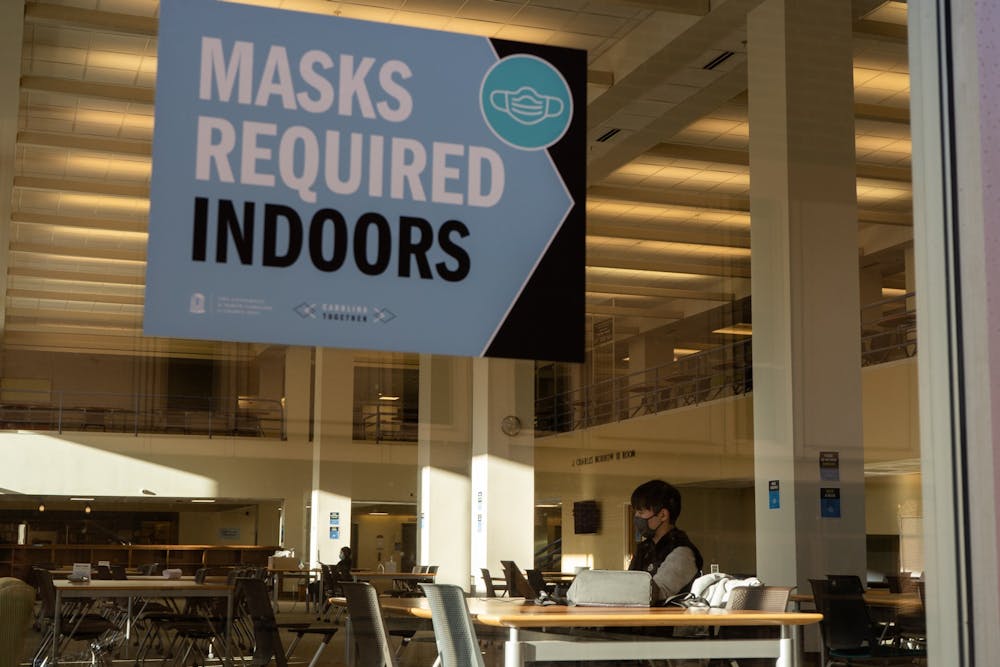AB: This variant of COVID is very low utility to asymptomatic testing.
(Asymptomatic testing is) not something that I think is widely recommended as a mitigation strategy. You use up a lot of testing supplies that could be used for other things, such as symptomatic testing, which is where we should be focusing our testing right now.
DTH: Can you explain why the incubation period of omicron variant was justification for making testing by appointment this semester?
AB: If you have a very short incubation period that's faster to transmit, then asymptomatic testing in itself is not very useful.
Let's say if there were 4,000 people that wanted to test on a daily basis. Our lab simply could not process that many samples in a day. It's very hard for a lab to do that on a given day, and so, we wouldn't be able to give you an actionable test. We would have to wait two, three days to get your results. I mean, that doesn't help anybody. So, all this is why the reservation system is in place because it still allows for over 1,000 people a day to be tested, but also helps us kind of keep that flow coming in on a consistent basis across the day.
DTH: What was the rationale to not have isolation dorms this semester?
AB: The idea to move people around for a very short period of isolation is kind of a strain on the resources of the system. In addition to that, your likelihood — again with the faster incubation — is that basically their transmission rate probably happened if you were tested positive with someone that you're living with.
We have been working very closely with people, and quite honestly, from a housing standpoint, people have worked with their roommates very well.
DTH: What are your suggestions for students living in communal housing? Are there solutions for out-of-state and international students that can’t go home to isolate?
AB: I think that the important thing is to be honest with your roommate, have an honest candid conversation and then to notify each other and what you think is a reasonable kind of plan that you guys can make together. I do recommend that people that have issues to reach out to the Office of Housing and just kind of talk about what their issues are. In general, I think that people have found a way as we're learning more about this virus and coping and living with this virus.
DTH: The University has said that there's not a necessity for N95 masks compared to other masks. But some professors are requiring surgical or N95 masks in their classroom. What are your thoughts on that?
AB: I think most people think there's a big difference between clinically wearing an N95 mask and an off-the-shelf N95 mask. If your N95 is loose, then it doesn't really help more than any other mask. Quite honestly, I would much rather people have a mask that fits their face well. I would just stress that if you're going to wear a mask, it should be well fitted.
To get the day's news and headlines in your inbox each morning, sign up for our email newsletters.
DTH: Per CDC guidance, the University has shortened the isolation period for students that test positive to five days. Do students have to test negative? Or do they just have to isolate for that time period?
AB: Retesting is a big strain on testing supplies and the system. Our PCR testing is very, very sensitive, you can have a positive test that lingers for three weeks, four weeks, two months, because there's a very low level of the viral RNA that's left in your nose. This is one of the reasons why the general recommendation that we've always made is that if you've had a positive test, you're excluded from the testing program. We encourage you to not test again within 90 days unless you develop new symptoms.
I would recommend that people follow the general guidance on symptoms. If you had a positive test and you are feeling better, you've isolated for five days, your symptoms are getting better and you're without a fever for at least 24 hours — that's when you can come out of isolation.
DTH: Are there any other thoughts that you would like to give to the campus community on what COVID-19 is looking like as we continue the spring semester?
AB: I've been so impressed by our students. I think that everyone is working really hard to make an enjoyable experience for residential education here on campus. I think that our students are doing an amazing job, and you guys deserve a lot of credit. The vaccination rates on our campus are tremendous. I think we've done a really good job of working together.
We're working together to try to take care of one another and just encouraging people to do the things that they can to keep themselves safe — getting vaccinated, getting a booster when you're eligible and wearing masks as much as possible.
@alliemkelly
university@dailytarheel.com



